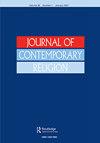The Digital Evangelicals: Contesting Authority and Authenticity after the New Media Turn
IF 0.6
3区 哲学
0 RELIGION
引用次数: 0
Abstract
suspicion emerges in chapter 5 where she makes much of David Foster Wallace’s novel The Pale King. It, too, deals with responses to boredom in the improbable context of lectures on tax regulations as found in an accountancy class. Its teacher is a Jesuit priest, which enables the main character of this unfinished work to find a “Jamesian divinity in the fundamental elements of his data-based bureaucratic world” (97). This broadly relates to what Mosurinjohn is perhaps seeking for the study: the right relationship between “psychic interiority and affective collectivity” (98). A depressive, Wallace left a two-page suicide note inside the manuscript. Somewhat of a celebrity writer working on the frontiers of the counterculture and postmodernity, he made two definite efforts to become a Catholic through the Rite of Christian Initiation for Adults (RCIA), although, in the end, did not convert. A similar sense of taking matters to a theological frontier seems to haunt this rich, condensed, and thoughtful work which opens out many vistas for further advance. The author works well across many disciplinary areas to produce a work of originality and creativity. In a sense the study is perverse for she has managed to open out a theology of the mundane, more usually treated as its graveyard.数字福音派:新媒体转向后的权威与真实性之争
本文章由计算机程序翻译,如有差异,请以英文原文为准。
求助全文
约1分钟内获得全文
求助全文
来源期刊

Journal of Contemporary Religion
RELIGION-
CiteScore
1.20
自引率
0.00%
发文量
59
期刊介绍:
Journal of Contemporary Religion is an international peer reviewed journal. Its purpose is to both document and evaluate the anthropological, sociological, psychological, and philosophical aspects of emerging manifestations of religiosity in any part of the world—whether within innovative movements or mainstream institutions. The term ''religion'' in the title of this journal is understood to include contributions on spirituality. Moreover, as the journal title suggests, the focus is on contemporary issues. Therefore, the editors of Journal of Contemporary Religion welcome submissions which deal with: classical topics in the study of religion, such as secularisation and the vitality of religion or traditional sectarian movements; more recent developments in the study of religion, including religion and social problems, religion and the environment, religion and education, the transmission of religion, the materialisation and visualisation of religion in various forms, new forms of religious pluralism, the rise of new forms of religion and spirituality, religion and the Internet, religion and science, religion and globalisation, religion and the economy, etc. theoretical approaches to the study of religion; discussions of methods in relation to empirical research; qualitative and quantitative research and related issues. The Journal includes reviews of books which reflect the above themes.
 求助内容:
求助内容: 应助结果提醒方式:
应助结果提醒方式:


